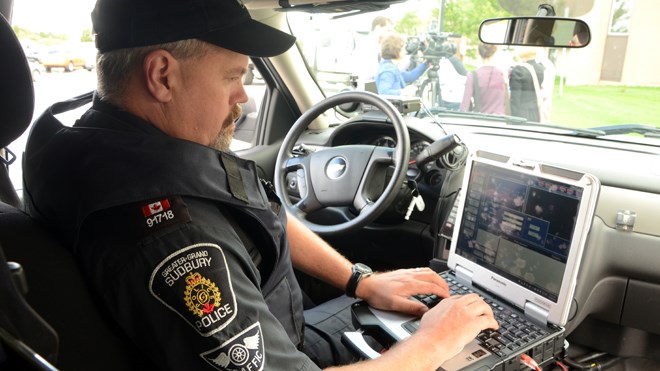After more than two years of planning, Greater Sudbury Police unveiled its licence plate scanning pilot project Wednesday, and were able to show reporters how quickly the scanners can make an impact.
Sgt. Steve Russell said that, ahead of the morning news conference in Azilda, the camera-equipped vehicle was set up nearby with several police cruisers. Check out our video here.
"Our very first stop this morning, the very first vehicle detected by this new technology, resulted in a suspended driver, who also had no insurance, unauthorized plates, and it was an unfit vehicle," Russell said. "He had his seat strapped in with ratchet straps.
"The vehicle shouldn't be on the road. The driver shouldn't be on the road. And it was this technology that pointed it out to us."
In all, more than a dozen people were charged Wednesday morning, including four suspended drivers, one person with no insurance and another driving an unsafe vehicle.
The system costs about $45,000 per vehicle, and will be installed in one car for the next year. It can scan 3,500 plates an hour using three cameras — one each on the back and front, while one on the side scans parked cars as officers patrol an area.
"The technology in the camera is such that it is colour and infrared, so it works daytime and night," Russell said.
Insp. Todd Zimmerman said the searches are restricted to drivers with “issues” such as suspended licenses, expired plate stickers, no insurance, etc. The data comes from the MTO, which can add things like Amber Alerts to the search parameters when such cases arise.
"This unit does have technology so we can add additional plates — say, stolen vehicles — and we will explore that through our pilot project, but it isn't something that right now that we're doing right away," Zimmerman said.
He said police can add other licence plates to the search parameters "if need be for an investigative reason (but) we're not operating with that presence right now."
The force is being mindful of privacy concerns, he said, and any plates searched that don't return a “hit” for a violation are deleted from the database. As the pilot project progresses, police will release statistics on how effective the technology is performing in a city with more than 10,000 suspended drivers.
Depending on how well the project performs, Zimmerman said more vehicles could be equipped with the technology in the coming years. But those sorts of decisions are dependent on what they learn in the coming year, and how much money is available to equip more cars.
"We will explore adding additional vehicles at the end of the pilot project," he said. "To outfit every vehicle in the Greater Sudbury Police Service fleet may be something we can't possibly do."
Join Sudbury.com+
- Messages
- Post a Listing
- Your Listings
- Your Profile
- Your Subscriptions
- Your Likes
- Your Business
- Support Local News
- Payment History
Sudbury.com+ members
Already a +member?
Not a +member?
Sign up for a Sudbury.com+ account for instant access to upcoming contests, local offers, auctions and so much more.
